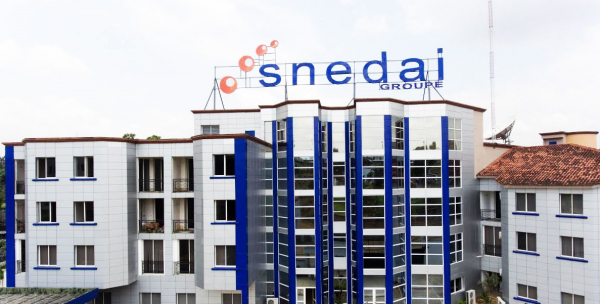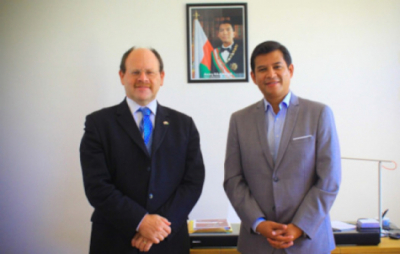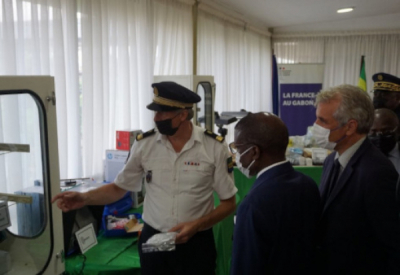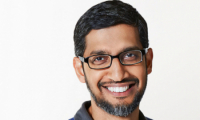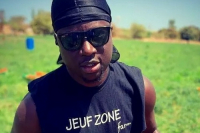The Organisation Internationale de la Francophonie announced the opening of several digital training courses for young Africans. The program, which first targets Tunisia and Togo, is part of the pilot phase of the institution’s "D-CLIC, train yourself in the digital" initiative.
The training targets people aged between 18 and 35. In Tunisia, the first course focuses on the development of multiplatform video games while the second addresses the production of augmented reality / virtual reality applications. The courses are organized in partnership with NetInfo and will be held in the cities of Nabeul and Tunis, starting from February 11, 2022, for 12 weeks each. Registrations are open until February 10.
In Togo, the training will be held in Lome on web and mobile application development. The courses, led by the pan-African organization Energy Generation, will be held over 6 months.
Ten countries overall are targeted by the "D-CLIC, train yourself in the digital" program. These are Côte d'Ivoire, Djibouti, Gabon, Haiti, Madagascar, Mali, Niger, DR Congo, Togo, and Tunisia. While several of these countries have already hosted training, and will soon host additional modules, Djibouti and Gabon are expected to soon host their first courses.
"D-CLIC, train yourself in the digital" is aimed at strengthening the technical and professional digital skills of young people and women in the Francophone area to increase their chances of accessing decent jobs in business and entrepreneurship.
Vanessa Ngono Atangana
The Ministry of Economy and Finance (MEF) and the Investment Promotion Center (CEPICI) in Côte d'Ivoire are working to digitalize their services. The local company Snedai Technologies is providing its technical assistance to help in the process.
The contract with the Ministry of Finance, on behalf of the Observatory of the Quality of Financial Services (OQSF), concerns the development of web and mobile applications that will enable the public body to better ensure financial education of the population. These digital tools will also serve as a financial mediation platform that will further promote the amicable settlement of individual disputes between financial organizations and their clients.
The digital services company will also provide the OQSF with a website to compare the offers of financial services providers. The goal is to promote transparency, ensure user understanding, and enhance the comparability of services. The deal with CEPICI focuses first on the development of a modern digital and responsive platform for electronic mail management (EML), followed by project management, performance management, investor monitoring, and dashboard management through business intelligence.
The acquisition of digital tools is in line with the government’s ambition to digitalize public services in the financial sector, through the Project to Improve Governance and Delivery of Basic Services to Citizens (PAGDS).
Launched in 2019 and financed by the World Bank, the project has already enabled, among other things, the deployment of the electronic revenue payment platform -Net collect- in 54 communities; the operationalization of the Treasury's e-payment platform -Tresor pay- for the online collection of state revenues; and the operationalization of the road contract management platform -ageroutemarche.ci.
Adoni Conrad Quenum
Ranked in 2020 among the least prepared nations in Africa for e-government, Madagascar received $140 million from the World Bank in 2021 to improve its score.
The UK is ready to help Madagascar accelerate its digital transformation. The subject was discussed recently between Tahina Razafindramalo (photo, right), Madagascar's Minister of Digital Development, and the British ambassador to Madagascar, David Ashley (photo, left). The exchanges focused on the digitalization of public services, cybersecurity, and data protection in Madagascar.
David Ashley says his country will offer expertise in this domain to help Madagascar better meet the multiple needs identified for the promotion of e-governance and support the digital transformation process. A possible collaboration with the British private telecommunication sector was also discussed.
With the Covid-19 pandemic, the dematerialization of public services is accelerating worldwide and particularly in Africa. Madagascar ranked 172nd out of 195 countries, according to the UN's E-government development index 2020, with a score below the East African and African average. In September 2021, the country received $140 million from the World Bank to streamline and digitize key services and improve the government's capacity.
Adoni Conrad Quenum
The online library YouScribe unveiled plans to strengthen its presence in Africa. Yesterday February 8, it announced it has secured €5 million from the French Banque des Territoires.
The startup will use the money to accelerate its expansion on the continent, especially in the ten countries (Côte d’Ivoire, Senegal, Morocco, Mali, South Africa, Cameroon, Tunisia, Burkina Faso, DRC, and Madagascar) where it already operates. YouScribe also eyes seven new markets on the continent and plans to expand its collection with new books, and diversify payment methods.
According to Maud Franca, deputy director of the Program of Investments for the Future at the Banque des Territoires, the investment aims to support the profound changes that the French-language book and publishing sectors are experiencing with digital technology.
"YouScribe is a response to the challenges that must be met collectively to provide alternative offers to the large online library platforms, often foreign, and to support publishers and authors in the French-speaking world, while also thinking of the younger generations, who are fans of social media and mobile applications,” she said.
The number of French speakers in the world is expected to increase from more than 300 million currently to 750 million in 2050, making French the second most spoken language after Mandarin, according to the Observatoire démographique et statistique de l'espace francophone (ODSEF). The latter estimates that more than 70% of French speakers will be Africans and Africa will have more than 90% of young French speakers aged 15-29. However, the lack of distribution infrastructure and the high cost of paper books could accentuate the low access to reading for Africans.
The relevance of the project earned YouScribe the Ernst & Young Entrepreneur Award in 2013. In 2015, the initiative received the 2017 Digital Africa Challenge Award, organized by AFD, French Tech, and Bpifrance. In 2018, Orange Africa chose the startup to promote access to reading in countries where books are poorly distributed.
By the end of 2021, YouScribe was already claiming nearly 700,000 subscribers, up 100% from 2020. By 2025, the online library with more than one million books, audiobooks, and educational digital documents targets several million subscribers, 80% of which will be in Africa.
Over the past decade, ICT has been touted as an asset for the modernization of several business sectors. In the security sector, there are many applications for law enforcement.
On Thursday, February 3, the Gabonese technical and scientific police received, in Libreville, a batch of technical equipment from France. The equipment was handed over by the French ambassador to Gabon, Alexis Mikhaël Lamek, and received by the Minister of State, Minister of the Interior, Lambert-Noël Matha. It will help Gabonese authorities better fight crime, document fraud, or child and women abuse by contributing to the establishment of a digital criminal database.
Among the equipment received are scanners, an episcope for the coding and reading of analytical characters of fingerprints, various equipment for the biometric signaling of persons in custody. "This new equipment will especially help to boost the functioning of the Directorate of Technical and Scientific Police, making it more efficient when searching for objective proof of guilt or innocence," said the Minister of the Interior.
Last year also it should be recalled, France gave similar equipment to the Gabonese police, notably as part of the French-Gabon internal security partnership.
The digital criminal file will enable the Gabonese police to link criminals to their crimes more easily. It will do so by helping them rapidly identify matches and differences between prints, marks, and clues secured on crime scenes or from the victim(s) during a police investigation.
Adoni Conrad Quenum
Already operational in Nigeria, Ghana, and Kenya, the mobile app’s founders now prospect in Europe, India, and Australia. They want to make the app a reference in the car industry.
On Feb 4, 2022, the South African start-up secured $1.3 million in a follow-on round that recorded the participation of Kalon Venture Partners, Launch Africa Ventures, IDF Capital, Allan Gray E2 Ventures, and AlphaCode. The first three investors had already contributed an undisclosed amount during Carscan’s seed round in October 2020.
Carscan is an augmented reality (AI) mobile application with integrated artificial intelligence (AI). It creates an accurate, reliable, complete, and traceable exterior or interior scan of a car. Launched in 2019 by Obins Choudhary and Chander Prakash, it helps actors of the car market buy, sell, lease, maintain, insure, finance, and auction cars with confidence.
With a database of over two million pictures of cars in different conditions, the app's technical inspection of cars helps detect modifications, dents, scratches, etc., estimate the overall condition of a car and estimate the extent of repairs needed in real-time. The app is also useful for insurers and individuals.
Chander Prakash, the co-founder of Carscan, said the company “is working with some local and international clients and has been developed in conjunction with one of the largest players in the automotive sector in South Africa.”
Explaining their interest in Carscan, Clive Butkow, CEO of Kalon Venture Partners, said the startup has demonstrated exceptional talent and its solution solves a large problem across industries. He said the new round is “testimony to the growth of the company and the Carscan’s team’s ability to deliver a solution solving a large problem across industries.”
Within three years only, Carscan has grown considerably. The App is already available in Nigeria, Ghana, and Kenya. This, its founders hope to expand to the European, Indian and Australian markets.
Ruben Tchounyabe
Under the digitalization process it initiated in recent years, the Ghanaian government announced the launch of an electronic travel card for public officials and envoys.
According to Vice President Mahamudu Bawumia, who introduced it last February 4 at the closing ceremony of the Annual Conference of the Controller and Accountant General’s Department (CAGD) in Cape Coast, the new instrument aims to bring further transparency and accountability in the use of public funds.
“Since independence, public officials were provided cash for their impress when they travel. This system had many associated problems, including the risks of carrying cash and fraud in the disbursement of impress […] Today, that era is coming to an end with my launch of the e-Travel Card to facilitate the cashless disbursement of travel allowance and other payments for local and foreign trips of public officials,” he said.
The Vice President said the solution will eliminate the risk of carrying cash, enable the timely retirement of accountable impress, and ease improved monitoring and control of budgetary allocations for all official travel to avoid overspending. The e-travel card was developed in partnership with Fidelity Bank. It aligns with the government strategy in place since 2006 to improve governance and development through ICTs.
Adoni Conrad Quenum
Several African countries have taken on extra debt last year to improve their digital migration readiness. Investing in the right sectors is now the next important step to hit the target. To help the countries better identify the priority sectors and make the best choices in terms of investments, Sundar Pichai (pictured), Head of the US tech giant Google, suggests four steps to follow.
In an op-ed published yesterday February 7, he reported that Africa, like India a few years ago, has the potential to boost its development by investing smartly in ICTs. He says the continent is already on the right path as it enjoys a large, full-of-energy, and ICT-savvy youth.
The very first step, according to him, is to expand affordable and reliable connectivity across the continent. He believes that many Africans will be left out if they do not have access to connectivity. “We have seen during the pandemic that digital connectivity is a lifeline, helping people find essential information and connect to critical services,” he said.
He secondly suggests that governments and relevant authorities support businesses of all sizes in their digital migration processes so that the digital divide is closed. “Closing that gap means enabling businesses to move online, training more people to pursue careers that depend on technology, and ensuring that companies take advantage of cloud computing,” Sundar Pichai added, stressing that “companies should invest in products and solutions that are fit for Africa, and African governments need to adapt regulatory environments and their own development strategies to be digital-first. Small businesses need to be at the center of digitization and training efforts, as they employ around two-thirds of the continent’s formal workforce.”
A third step will be to invest in African entrepreneurs to stimulate innovation and growth. He finally called on African governments to support nonprofits and institutions striving to address communities’ challenges through technologies.
In 2021, Google made a $1 billion investment in Africa to back the continent's digital transformation. This comes in addition to several other investments made on the continent over the past four years by the company.
In its joint report with the International Finance Corporation (IFC), "e-Conomy Africa 2020 - Africa's $180 Billion Internet Economy Future," Google points out that Africa's Internet economy has the potential to grow to $180 billion, or about 5.2% of the continent's GDP, by 2025 with an economic potential of $712 billion by 2050.
Muriel Edjo
While he seemed destined for a glittering political career in the United States, Niang decided to return home to pursue a Senegalese dream. Thione Niang was born in Kaolak, Senegal, in a family of 28.
The man who now describes himself as a political strategist and social entrepreneur arrived in the US in 2000 with just $20 in his pockets. He started building his American dream with odd jobs. He first lived a couple of years in the Bronx, working in a restaurant, before moving to Cleveland where he stepped into the political world and volunteered for Councilman Kevin Conwell’s municipal campaign in 2005. He then became deputy campaign manager for mayoral candidate Frank Jackson. Much later, he was the campaign manager of the black congresswoman Shirley Smith who wanted to become a senator. Shirley Smith introduced him to Senator Barack Obama in 2006, in Columbus. And two years later, Thione Niang became the community organizer for President Barack Obama during the 2008 presidential elections.
He was then named national co-chair of "gen44," the 44th annual American youth fundraising initiative, for the president's 2012 re-election campaign.
With this background, the Pan-Africanist decided to return to his home country in 2014 where he initiated various impactful projects. One of them is the startup JeufZone Farms, which he founded in 2015. JeufZone Farms is an agro-business platform that focuses on the production, commercialization, distribution, and conservation of local farm products using new technologies. The startup supplies its restaurants in Senegal and has a website for delivery. It also provides tools and training to young people who want to get into the business.
"It (agriculture, ed) is not a job for poor men living in villages without water or electricity […] Agriculture is noble and matters because it is the pillar of our economic independence. It is what feeds the country," he says.
JeufZone Farms has already trained more than 200 young people in many African countries and beyond. This year, the forty-year-old plans to expand his venture to Togo. Thione Niang discussed this expansion plan last February 6 with the Togolese Prime Minister Victoire Tomégah-Dogbé. Touting his solution, the entrepreneur said “the particularity (of the offer, ed) is that we can use robots or connected tractors, or sensors that allow remote control to avoid travel on large farms in the agricultural field, for example. We will evaluate to what extent this can be done in Togo.”
Aïsha Moyouzame
National health systems must adapt to technological developments. This is something every country around the world realized with the COVID-19 pandemic. Sierra Leone, which has been making efforts in this regard since 2019, now explores international partnerships to quickly bridge the mismatch between its health system and technological developments.
The United Arab Emirates (UAE) is offering Sierra Leone its digital health expertise. The UAE Ministry of Health and Prevention revealed this on Monday 7 February after the two countries' respective health ministers, Mohammad Salim Al Olama (UAE) and Austin Demby (Sierra Leone) discussed the matter while recently meeting in Dubai.
During the meeting, Mohammad Salim Al Olama briefed the Sierra Leonean minister and his delegation on the UAE's achievements in digital health services and health innovation, in line with efforts to fight diseases, improve health education, promote healthy nutrition, etc. The official also spoke about the UAE government's progress in health data management and health information systems development.
Sierra Leone has one of the worst health systems in the world, according to the 2021 Global Health Security (GHS) Index. Produced by the Nuclear Threat Initiative (NTI), the John Hopkins Center for Health Security at the Bloomberg School of Public Health, working with Economist Impact, the GHS Index assesses 195 countries across six categories, 37 indicators, and 171 questions. Using publicly available data, the index compares health security in featured countries, based on their capabilities to prevent diseases, the number of doctors, the number and quality of health facilities, etc. In last year's rankings, Sierra Leone was 116th with a score of 32.7 out of 100.
Leveraging digital technologies to improve its public health system, Sierra Leone will have to invest heavily in its internet infrastructure. The country's internet penetration rate currently stands at 25% only, according to the Hootsuit and We Are Social Digital Report.
In 2019, Sierra Leone became the first African member state of the World Health Organization (WHO) African region to fully digitize its disease monitoring system. The project was started with the WHO's support and was successfully deployed in all 14 districts of the country as well as in all its public health facilities.
Muriel Edjo
More...
Nine (9) months after raising $1.8 million in seed funding, Lami has acquired Bluewave Insurance Agency. This acquisition will open the doors to 7 African markets, including the DRC, where Bluewave offers its insurance services.
Kenyan insurtech, Lami Technologies, announced the acquisition of competitor Bluewave Insurance Agency for an undisclosed amount. “I am very enthusiastic about this acquisition and believe it will bring exponential growth for both companies. With increased resources, enhanced technology and innovation, expertise, and market expansion, this acquisition will help us create a more competitive environment for insurtech in Africa as we continue to work on providing insurance products that are affordable and convenient for all Africans,” said Roy Perlot, CFO, Lami Technologies.
The announcement comes 9 months after Lami Technologies raised $1.8 million in seed funding. This new acquisition “aims to drive rapid growth for Lami and expand its presence to new African markets with an expected business growth of 65,000 current policies and potential growth of hundreds of thousands expected in 2022 across Kenya, Malawi, Tanzania, Uganda, Rwanda, Nigeria, Gambia, and the Democratic Republic of Congo (DRC),” the company said.
The deal will also expand Lami's customer/product segment in Malawi where Bluewave reaches more than 60,000 smallholder farmers with access to policies. Between 2018, when it was founded, and May 2021, Lami says it sold more than 5,000 policies and partnered with more than 25 active underwriters, including Britam, Pioneer, and Madison Insurance.
In a note published in May 2021, the company estimated that the African insurance market, which stands at a 3% penetration rate, South Africa excluded, faces challenges in modernization and innovation. These challenges include traditional policy administration, lack of knowledge of insurance products, inflexible offerings.
Chamberline Moko
Ghanaian-born British entrepreneur Danny Manu will disrupt the tech world with his 4G connected earbuds, Titan, the first in the world. The 33-year-old entrepreneur announced his invention during the CES (Consumer Electronic Show) 2022 in Las Vegas.
The Titan earbuds will be equipped with an eSIM that allows users to make and receive calls and text messages independently of their smartphones. The devices will use their own mobile data that can be activated with the built-in eSIM. They can be controlled by a voice interface, eliminating the need for a screen or buttons, making them easier to use for people with visual disabilities.
“There are many situations where you either don’t want to carry your phone around or that it’s just not suitable to have with you but you still want to be connected. Titan solves that problem,” Danny Manu said, stressing that this breakthrough can overshadow mobile phones.
“It’s a real breakthrough for the phone industry and will shake up how we can communicate using technology overall. To have a device that doesn’t require touch or sight to function is finally bringing tech away from that addiction and dependency on screens that today’s consumer has and it’s a step in the right direction for more accessible technology,” he explained.
Let’s note that this new solution builds on a previous model launched by Danny Manu in 2014 with his MyManu startup. The entrepreneur designed in 2014 [MyManu Click] the first headphones with a built-in translation system that can translate 40 languages in real-time.
Danny Manu has been recognized by Google for his contributions to science, art, and culture. His inventions have gained widespread popularity in the United States, Europe, and Asia, which are the main markets for MyManu.
Aïsha Moyouzame
Tunisia’s first fashion marketplace for women Dabchy has gained popularity in the country. The online platform was launched in 2016 by the eponymous startup founded by Ameni Mansouri, a biomedical engineer with a passion for fashion, Ghazi Ketata, a computer security engineer, and Oussema Mahjoub, a web developer.
The platform, which claims $550,000 invested so far in its development in Tunisia, Morocco, and Algeria now plans to expand in the Middle East. The service connects thousands of women who want to sell, buy and trade second-hand clothes.
"Dabchy is a community of hundreds of thousands of women who love fashion. They share not only their wardrobes but also all their worlds with great looks," explains Ameni Mansouri, president, and CEO of Dabchy. To date,1.1 million items are available on the platform. An article is posted every 40 seconds and more than 500,000 users are registered, according to the co-founders. Customer service is handled 100% in-house using technology. The site has several features. It offers the user the ability to view the latest items posted, sorted by category, color, brand, and condition (new with tags, new without tags, very good condition, good condition, satisfactory). All seller is required to provide pictures, descriptions, and the price of the article to be sold. The platform has also integrated a children’s session since 2018.
Dabchy has reached a partnership with the logistics service provider Aramex and the Tunisian Post Office to ensure fast delivery of goods via Rapid-Poste. Payments are either made online via bank account or e-Dinar card, or in cash. When payment is made in cash, the buyer pays the amount to the delivery agent, who in turn deposits it into a Dabchy account.
The platform administrators can then verify the transaction and quickly send the amount to the seller. The latter receives the money 24 hours after delivery.
In 2019, Dabchy raised $300,000 in a round led by the incubator 500 Startups, with the participation of Flat6labs Tunisia, Vision Venture Capital, Daal Venture Capital, as well as a group of Business Angels. The following year, the platform won the MEA Seed Challenge of Orange Ventures, the investment fund of Orange, and shared €670,000 with winning startups from other countries. To date, Dabchy has received $550,000 in funding. The startup, which plans to open in the Middle East, also plans to launch a "VIP service" to authenticate luxury clothing or accessories worth more than TND300 ($104.80).
"We want to offer a service that allows us to become a platform for luxury second-hand clothing, so we can target markets such as Dubai, for example," says Ameni Mansouri.
Ruben Tchounyabe
Founded two years ago, Chari.ma reached a valuation of $100 million last January. The startup is now at the heart of several development projects, backed by big investors.
Sophia Alj (photo, left) and Ismael Belkhayat (photo, right), co-founders of Chari.ma, were crowned "Endeavor Entrepreneurs" during the international jury selection held last January 24-26. The award from Endeavor Global, a global community of high-impact entrepreneurs, is the result of the success of the two recipients' digital shopping service for local merchants. Endeavor Global says the startup has a high potential for development and the founders are willing to commit to sharing their knowledge and experience with other entrepreneurs.
Founded in January 2020, Chari.ma has achieved many successes over the past two years. As of December 2020, it has claimed nearly $2.5 million in order value per month. That same month, Chari.ma won the Middle East Africa Seed Challenge organized by Orange Ventures. The following year, in August, it acquired the mobile credit card application Karny.ma, then raised $5 million in a round led by Rocket Internet, Global Founders, and P1 Ventures in October 2021.
In January 2022, the startup successfully raised another round of funding in a deal led by Khwarizmi Ventures, Air Angels (Airbnb Alumni Investors), and Afri Mobility. Plug and Play, Combinateur Y, Village Capital / MetLife Foundation, Orange Ventures, Air Angels, SPE Capital, Pincus Private Equity, Reflect Ventures, the Chandaria family, Michael Lahyani (CEO and founder of Propertyfinder) also took part. Chari.ma will use the resources to enter the consumer credit segment and further its African expansion.
The new step by Sophia Alj and Ismael Belkhayat paves the way to achieve their ambition. The Endeavor award gives the newly selected entrepreneurs “access to comprehensive, strategic, global support services, including introductions to local and international business mentors, investors, and volunteers from Fortune 500 consulting firms who will help them address key needs,” says Endeavor Global.
This year, Sophia Alj and Ismael Belkhayat are the only two African entrepreneurs out of 12 selected by Endeavor Global in seven markets worldwide, including Vietnam, Morocco, Bulgaria, Brazil, Mexico, the United Arab Emirates, and Jordan.
Muriel Edjo



